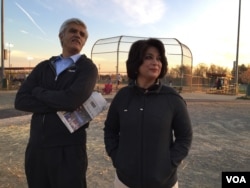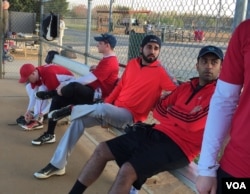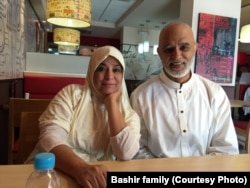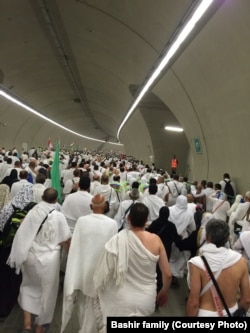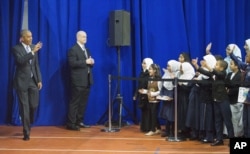This is the second article in a three-part series on Islamist Extremism in America.
The pitch is fast, but the swing of the bat is on target.
Danish Bashir, 25, sprints toward first base as his parents, Imran and Amina, cheer for his adult softball league team from the stands. It’s a scene that could take place in any town across America.
The Bashir family are Pakistani-American immigrants; their two sons, Danish and Daniyal, were born and raised in the U.S.
They are part of the fabric of the 3 million-plus Muslims living in the United States. According to a recent Pew Research Center report, Islam will be the second-largest religion in the U.S. by 2050.
If presumptive Republican presidential nominee Donald Trump — who has called for a ban on Muslims entering the U.S. — were to get his way, families like the Bashirs would never have been allowed in America. And they never would have had the opportunity to become citizens.
Calls for ban
In a speech given Monday after the shooting in Orlando, the real estate mogul doubled down on his call for a ban.
“The bottom line is that the only reason the killer was in America in the first place was because we allowed his family to come here," Trump told the crowd. "That is a fact and it is a fact we need to talk about."
Amina and Imran Bashir came to America in 1988 to attend Syracuse University in upstate New York. They met in their second year, eventually married, and decided to stay and raise their family in the U.S.
“We just embraced it,” says Amina speaking about integrating into American culture. “We were used to student life. We came and it was a lot of fun. Imran would wake up with MTV on. We loved it over here.”
The Bashirs have settled comfortably into a colonial-style home in the upper-middle-class Virginia suburbs of Washington.
Family
Imran and his eldest son, Danish, work in the computer technology industry. The youngest son, Daniyal, is a doctor of pharmacy candidate at the University of Baltimore.
“Springfield is good enough,” Amina said of the town she calls home. “Everything is here. We all have family near here, they are all split up and it doesn’t matter whether our neighbors are Muslim or not. You know it really doesn’t matter to me.”
While there are cities in the U.S. that have large concentrated Muslim populations, the vast majority are well integrated — spread out in mixed neighborhoods across the country.
Muslims in Europe
Molenbeek, a Brussels melting pot of more than a half-dozen nationalities, is located a half-hour walk from the city’s fabled Grand Place. It’s here where some jihadi fighters have returned from Syria, and where some of the suspects linked to terrorist attacks in Brussels and Paris grew up.
But Molenbeek is more than the sum of a few radical residents. It is the reflection of today’s rapidly changing, multicultural Europe that demands, experts and activists say, new ways of rethinking integration.
For some, that means recognizing different notions of belonging — to a neighborhood or city, for example, as well as to a nation. Others believe it also means abandoning traditional assimilation models and adopting a more U.S.-style approach toward religion and multiculturalism that reflects the melting pot reality of Europe today.
“It doesn’t matter whether you have a veil on your head, what’s important is what you have inside your head,” says sociologist Corinne Torrekens, a specialist in Muslim communities at the Free University of Brussels.
“We have to stop with this debate of neutrality and secularity in Belgium and recognize and accept our multicultural society in all its manifestations. Not just when we want to drink mint tea or eat Turkish pita," Torrekens said.
Similarities to France
The same debate is playing out in neighboring France, reflecting larger similarities between the two countries.
“These children from the second and third generation don’t really feel French because they feel rejected by the nation and its core values,” said Alexandre Piettre, a sociologist at the Paris-based Society, Religion and Secularism Group (GSRL). “That’s a big difference with the United States, where African Americans, for example, also may feel rejected, but they feel American."
Both Belgium and France are profoundly secular countries that push assimilation rather than diversity when it comes to new arrivals.
Both are leading European exporters of jihadist fighters. Both have high populations of North African immigrants and their offspring. And both are grappling with the fallout of Islamist terrorist attacks that appear increasingly intertwined.
How America differs
The demographics of Muslims in America are very different from Europe.
According to the Pew Research Center study, Muslims in the U.S. are well-educated, and enjoy higher incomes when compared to most other religions.
Of Muslims in the U.S., 39 percent hold a college degree, while only 25 percent of Christians have completed higher education.
Those degrees translate into higher income.
The 2015 median household income in the U.S. was $53,657. Nearly a third of Muslims, 29 percent, earn between $50,000 and $100,000. And 20 percent earn more than $100,000 per year.
Slightly fewer American Christians, 27 percent, earn between $50,000-$100,000, while only 17 percent of Christians earn more than $100,000.
Reality
This reality belies the picture painted by Trump, the Republican presidential candidate.
Trump first called for a ban on Muslims entering the country last March after the Brussels bombings. He went on to suggest the Muslim faith was rooted in hatred and violence.
“Where this hatred comes from and why, we will have to determine,” he said.
Trump's call for a ban on Muslims entering the U.S. was quickly denounced as unconstitutional and counterproductive by legal scholars and terrorism experts.
Misguided
Seth Jones, a terrorism expert with the Rand Corporation, said the idea of banning Muslims from the U.S. is a waste of resources and misguided because it misses the root of the problem.
“This isn’t about Islam, this isn’t about Sunni Islam, this is about a very small percentage of individuals who hold what we call a Salifi-jihadist world view to establish a global caliphate,” Jones said.
“This is a fringe group. The problem and the solution is to recognize and understand how and why there are fringe elements and how you get the 99 percent that oppose this to be helpful and supportive in identifying the fringe elements," he added.
After the Brussels attack, then-Republican presidential candidate Ted Cruz also spoke out. “We need to empower law enforcement to patrol and secure Muslim neighborhoods before they become radicalized,” he said.
Cruz elaborated in an interview with CNN’s Anderson Cooper: "If you have a neighborhood where there's a high level of gang activity, the way to prevent it is you increase the law enforcement presence there and you target the gang members to get them off the streets. I'm talking about any area where there is a higher incidence of radical Islamic terrorism."
The dark imagery of Cruz’s comments is hard to comprehend. There are no Islamic street gangs roaming neighborhoods in the U.S.
Yet, both candidates’ comments entered the media echo-chamber and were repeated thousands of times across all platforms, creating a false narrative about American-Muslims.
Experts say rhetoric like that plays right into ISIS hands.
“The message ISIS sends out [to Muslims] is that the West hates you, the West is at war with Islam. You do not belong in Western society,” said Lorenzo Vidino with the Center for Cyber and Homeland Security at George Washington University.
Fear of a backlash
Back at the Bashir residence in Springfield, Virginia, Imran and his son Danish are home from work.
Imran is cooking rice to go with dinner while Danish texts friends about a “Game of Thrones” watch party — the hit TV series that has captivated many young Americans of the millennial generation.
Imran said he is worried about the way Muslims are being portrayed in the presidential campaign. He told VOA it is probably best to keep a low profile.
“We are a middle-class family. We want to just be normal people. We want to enjoy. There is no reason to give anybody an opportunity and there are good people everywhere," Imran said. “It is very easy for somebody to point a finger and that can lead to some unnecessary impact or disturbance in my life.”
Danish says he doesn’t understand Donald Trump.
“I am still an American, too. And being an American is about being together, so my view is different from his. His hatred [at ISIS] is correct. But pointing to people in your own backyard? That doesn’t make any sense to me," Danish said.
He adds that he is blessed to live in a mixed neighborhood and have friends from all kinds of backgrounds.
“There is no segregation in terms of that. It’s equal opportunity. And that is what we have in America. We can come from nothing into becoming something great and achieving your goals. And that is why my parents came to America,” Danish said.
In the third part of this series, VOA explores the question, "What is counterterrorism?"





